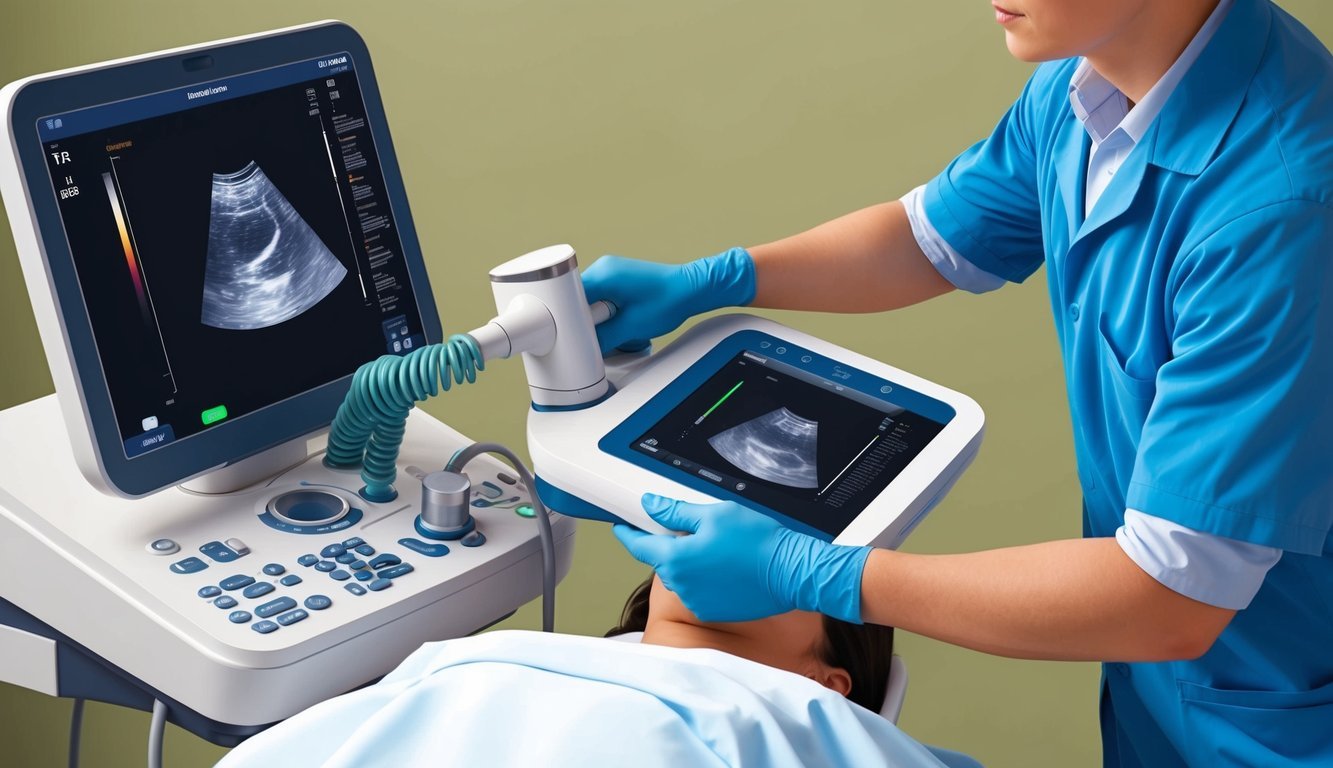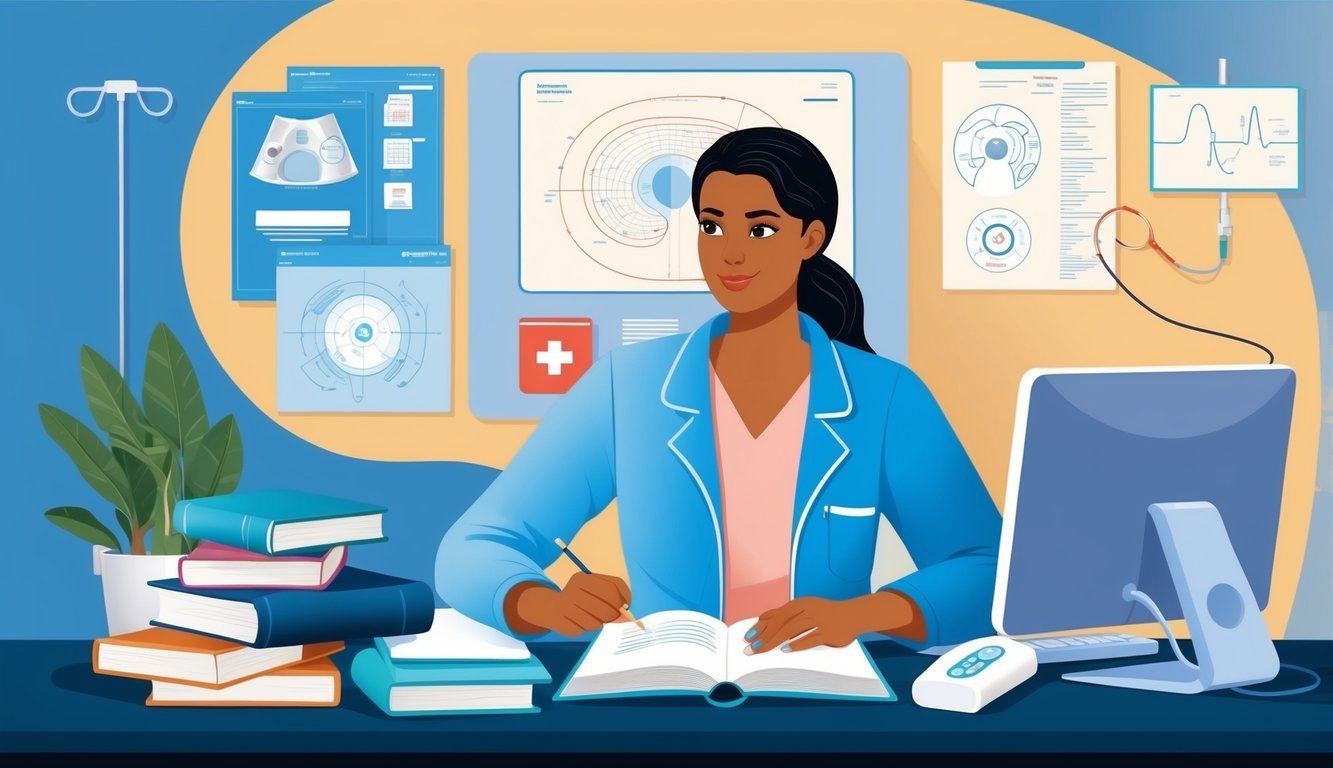Becoming an ultrasound technician is a rewarding journey, which opens up many career opportunities in the healthcare field.
Typically, it takes between 1 to 4 years to complete the necessary education and training to become an ultrasound technician.
Whether you choose a certificate program, an associate’s degree, or a bachelor’s degree, each pathway offers distinct benefits and time commitments.
As a sonographer, you will gain essential skills in diagnostic medical sonography and have hands-on clinical experience that will prepare you for various roles in the profession.
The flexibility in training options allows you to tailor your education to fit your career goals while also paving the way for further specializations and advancements in the field.
Key Takeaways
- Training to become an ultrasound technician can take 1 to 4 years.
- Different educational paths provide various levels of specialization and skills.
- Career opportunities expand with hands-on experience and further education.
Pathways to Becoming an Ultrasound Technician
Becoming an ultrasound technician involves various educational paths and certification processes.
You can choose between different programs based on your availability and career goals.
Educational Requirements
To begin your career as an ultrasound technician, you must complete an educational program.
There are several options available:
-
Certificate Program: This is a shorter option, typically taking about one year. It provides the basic skills needed for entry-level positions.
-
Associate Degree: This is the most common route. It lasts about two years and covers comprehensive training in sonography.
-
Bachelor’s Degree: Some choose this four-year option for more advanced knowledge and specialization opportunities.
Graduating from an accredited program is essential.
Programs should be recognized by organizations like the American Registry for Diagnostic Medical Sonography (ARDMS).
Completing these educational programs gives you a solid foundation in anatomy, patient care, and technology.
Certification Process
After your education, obtaining certification is crucial for employment.
There are different certifications you can pursue:
-
Ultrasound Technician Certification: This verifies your skills and knowledge in the field.
-
ARDMS Certification: You can earn it by passing specific exams. This is highly regarded in the industry.
-
Cardiovascular Credentialing International (CCI): If you intend to work in cardiovascular areas, this certification applies.
-
American Registry of Radiologic Technologists (ARRT): This certification can also be beneficial, especially if you have a background in radiology.
Generally, you will need to pass exams and may need to fulfill continuing education requirements to maintain certification.
Core Knowledge and Skills

As an aspiring ultrasound technician, you need to develop a solid foundation in several key areas.
Mastering these topics is essential for providing quality patient care and performing effective medical imaging.
Medical Terminology and Patient Care
Understanding medical terminology is crucial for ultrasound technicians.
You will encounter terms related to anatomy, procedures, and diagnostic processes.
Familiarity with these terms helps in clear communication with healthcare professionals and patients.
In terms of patient care, you’ll learn how to prepare patients for ultrasound exams.
This includes explaining procedures clearly and reassuring patients, which contributes to a calm environment.
Key aspects of patient care include:
- Taking patient histories
- Assessing vital signs
- Addressing concerns and questions
Building strong communication skills is essential for effective patient interaction.
Human Anatomy and Physiology
A solid grasp of human anatomy and physiology is vital for an ultrasound tech.
You will need to understand the structure and function of different body systems, especially those being examined.
This knowledge enables you to:
- Identify organs and abnormalities during scans
- Explain findings to physicians
- Select appropriate imaging techniques
Key systems to focus on include:
- Cardiovascular
- Musculoskeletal
- Reproductive
Knowing the anatomy helps in making accurate assessments during diagnostic procedures.
Sound Waves and Imaging Equipment
Understanding the principles of sound waves and how they relate to imaging is fundamental.
Ultrasound technology uses high-frequency sound waves to produce images of structures within the body.
Familiarize yourself with the types of imaging equipment commonly used, such as:
- Ultrasound machines
- Transducers
- Doppler ultrasound devices
You should also learn about:
- Ultrasound physics: How sound waves interact with tissues
- Equipment maintenance: Ensuring your tools are functioning properly
Hands-on experience with these devices will enhance your technical skills, making you more effective in your role.
Clinical Experience
Clinical experience is essential for becoming an ultrasound technician.
It provides you with valuable opportunities to apply what you learn in the classroom to real-world situations.
Through externships and hands-on training, you can develop the practical skills needed for this career.
Externships and Internships
In your path to becoming an ultrasound technician, clinical externships and internships are crucial.
During an externship, you work under the supervision of experienced professionals.
This experience typically occurs in hospitals or clinics and lasts several months.
Internships allow you to gain further experience and may be part of your educational program.
These positions help you learn about various ultrasound procedures, such as abdominal or vascular ultrasounds.
Many employers look favorably on candidates with hands-on clinical experience, which can be an advantage during job applications.
Hands-on Training
Hands-on training is a significant component of your education.
In your ultrasound technician training, you will participate in labs and practical sessions.
These sessions allow you to practice performing ultrasound scans and using the equipment.
Training covers essential skills, such as proper patient positioning and the use of ultrasound technology.
You gain experience in different settings, which is vital for your confidence and competence.
The practical knowledge you acquire during this time prepares you for clinical duties in your future job.
Many programs require you to complete a specific number of hours in hands-on training, ensuring you meet professional standards.
Specializations in Sonography
Sonography offers various specializations that allow you to focus on specific areas of healthcare.
Each specialty requires additional training and knowledge of distinct techniques and procedures.
You can choose from cardiac sonography, vascular sonography, abdominal and obstetric sonography, and other ultrasound specialties.
Cardiac Sonography
Cardiac sonography, or echocardiography, involves using ultrasound to assess the heart.
You learn to evaluate heart structures and blood flow.
This specialty is crucial for diagnosing heart diseases and conditions like heart murmurs and congenital heart defects.
Echocardiographers often work closely with cardiologists to provide critical information.
They perform tests such as transthoracic and transesophageal echocardiograms.
A strong understanding of anatomy and physiology is essential in this field.
For more details, visit Nurse.org on cardiac sonography.
Vascular Sonography
Vascular sonography focuses on the blood vessels using vascular ultrasound.
You learn to detect blockages, blood clots, and other vascular issues.
This specialty includes non-invasive tests like Doppler ultrasound and ultrasound angiography.
Vascular sonographers work with patients suffering from conditions such as peripheral artery disease.
Knowledge of hemodynamics and vascular anatomy is vital for accurate imaging.
Training also includes understanding flow patterns and interpreting results quickly.
You can explore more at Forbes on ultrasound technician careers.
Abdominal and Obstetric Sonography
Abdominal and obstetric sonography deals with imaging organs in the abdomen, as well as monitoring pregnancies.
You will learn techniques to assess organs like the liver, kidneys, and gallbladder.
This specialty is essential for identifying conditions such as gallstones or kidney stones.
In obstetric sonography, you monitor fetal development and assess pregnancy health.
Skills in measuring fetal growth and detecting abnormalities are crucial.
Being detail-oriented helps in producing high-quality images.
Those interested can read more about it on BestColleges on ultrasound technician programs.
Other Ultrasound Specialties
There are several other ultrasound specialties that you might consider.
These include neurosonology, which focuses on brain imaging, and musculoskeletal sonography, which assesses joints and soft tissues.
Pediatric echocardiography targets heart imaging in children, while gynecology sonography deals with female reproductive health, including monitoring ovarian and uterine conditions.
Breast sonography is also a significant area, often used alongside mammography for breast cancer detection.
Each of these specialties requires specialized training and a thorough understanding of the respective areas.
For more information about various specialties, you can check Ultrasound Schools Info.
Career Advancement and Outlook
The job market for ultrasound technicians shows strong demand, offering various opportunities for growth and competitive salaries.
Continuing education is essential to maintain your certification and stay current in this evolving field.
Job Market and Earning Potential
The median annual salary for ultrasound technicians was $84,470 as of May 2023.
Your earning potential can vary based on experience, location, and specializations.
Here’s a breakdown of salary ranges in different states:
| State | Median Salary |
|---|---|
| California | $105,000 |
| Texas | $81,000 |
| New York | $92,000 |
| Florida | $77,000 |
Job opportunities are projected to grow by 12% from 2022 to 2032, driven by the increasing demand for diagnostic imaging.
As a healthcare professional, you will find various roles in hospitals, outpatient centers, and private practices.
This growth offers a secure career path with numerous advancement opportunities.
Continuing Education and Certification Maintenance
To maintain your certification as an ultrasound technician, you must complete continuing education requirements.
Many states require a specific number of Continuing Medical Education (CME) credits every few years.
You may need to complete 30 hours of CME credits every two years to keep your certification active.
This education helps you stay updated with new technologies and advancements in the field.
Specializations, such as cardiac sonography, can further enhance your career prospects and salary potential.
Frequently Asked Questions

This section addresses common inquiries about becoming an ultrasound technician.
You will find specific information regarding schooling duration, educational requirements, major choices, program lengths, salary range, and potential challenges in the field.
What is the duration of schooling needed to become an ultrasound technician after high school?
To become an ultrasound technician, you typically need to complete an associate degree, which generally takes about two years.
If you already have a relevant degree, certificate programs may allow you to enter the field in as little as one year.
What are the educational requirements to become an ultrasound technician?
You need to graduate from an accredited program in diagnostic medical sonography.
These programs include courses in anatomy, physiology, and sonography techniques.
Most programs require a high school diploma or equivalent for enrollment.
What should I major in if I want to pursue a career as an ultrasound technician?
You should major in diagnostic medical sonography or a related field.
Some students may also benefit from majoring in health sciences if they plan to pursue a degree before entering a specialized ultrasound program.
How long is the shortest accredited program for ultrasound technicians?
The shortest accredited programs can be completed within one year.
These certificate programs are suitable for individuals who already have a degree in a related healthcare field.
What is the salary range for an ultrasound technician?
The salary for ultrasound technicians can vary widely.
On average, you can expect a salary range from around $60,000 to $80,000 per year, depending on experience, location, and the type of facility where you work.
What are the challenges associated with becoming an ultrasound technician?
Becoming an ultrasound technician comes with several challenges.
You need to have extensive knowledge of anatomy and equipment operations.
Additionally, you may work in high-pressure environments, especially in emergency situations.

